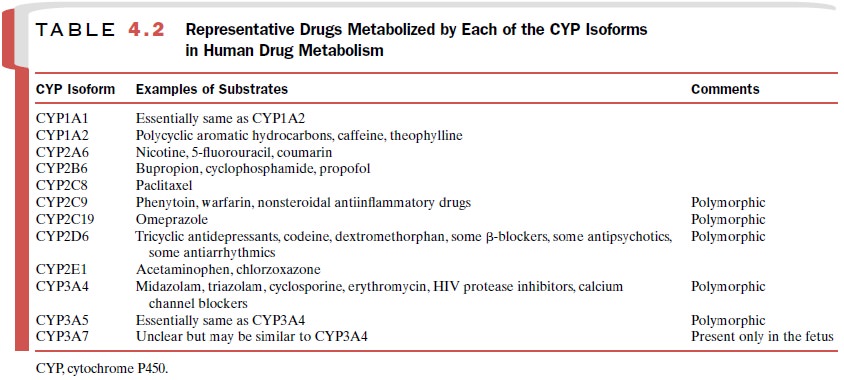Chapter: Modern Pharmacology with Clinical Applications: Metabolism and Excretion of Drugs
Pharmacogenetics of Drug-Metabolizing Enzymes
PHARMACOGENETICS
OF DRUG-METABOLIZING ENZYMES
One of the most interesting
and heavily researched ar-eas of drug metabolism today is genetic polymorphism
of drug-metabolizing enzymes (pharmacogenetics). As early as the late 1950s it
was recognized that individuals might differ in whether they could acetylate
certain drugs, such as isoniazid . In this case, the individuals studied
appeared to segregate into two distinct groups, rapid acetylators and slow
acetylators.
It was later discovered that
this polymorphism ex-isted in the N-acetyltransferase-2
gene and thus the NAT-2 enzyme. More important, it has become clear that slow
acetylators (about 50% of the caucasian popu-lation) are more prone to adverse
effects following ad-ministration of certain drugs than fast acetylators. For
example, it is well established that slow acetylators re-ceiving the
antiarrhythmic drug procainamide are much more likely to develop the systemic
lupus erythemato-sus–like syndrome that has been described as a charac-teristic
and therapy-limiting event associated with this drug. In fact, this adverse
event is rare in fast acetylators. Fortunately, the number of drugs that depend
on NAT-2 for their primary metabolic fate is small, so this poly-morphism is
clinically relevant only in certain situations.
Possibly the most studied
genetic polymorphism is that associated with CYP2D6. At least 17 variant
alleles of this enzyme have been identified, most being associ-ated with a
deficiency in the ability to carry out CYP2D6-mediated oxidation reactions.
Approximately 7% of the caucasian population is CYP2D6 deficient, whereas only
1–3% of African Americans and Asians are deficient in this enzyme. CYP2D6 is
responsible for about 30% of the CYP-mediated reactions (Table 4.2) and
exhibits this polymorphism. Likelihood of adverse events, such as the
dyskinesias associated with certain antipsychotic agents, have been linked to
this polymor-phism, since individuals who are CYP2D6 deficient have a higher
incidence of these side effects. To mini-mize adverse events and toxicity, care
should be exer-cised when prescribing drugs that depend on CYP2D6 metabolism.

Recently, variant alleles
(and thus polymorphisms) have been elucidated for most of the CYP isoforms. For
example, six alleles of CYP2C9 have been discovered, and several of them
profoundly affect therapy. The vari-ant allele CYP2C9*3 occurs in fewer than 1%
of the population, but affected individuals generally require doses of the
anticoagulant warfarin that are 10–25% of those required by unaffected
individuals. A CYP2C19 polymorphism also has been identified in 2–3% of
cau-casians and 20–30% of Asians. In this case, individuals who are CYP2C19
deficient are more likely to have complete ulcer healing after therapy with
omeprazole (a proton pump inhibitor that reduces gastric acid) than are extensive
metabolizers, a positive benefit.
Related Topics